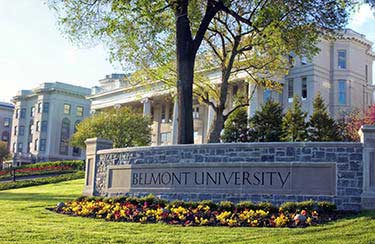Belmont University: An Introduction
 Belmont University is a student-centered Christian community providing an academically challenging education that empowers men and women of diverse backgrounds to engage and transform the world with disciplined intelligence, compassion, courage and faith.Fundamental to that vision are faculty who bring immeasurable life experience and knowledge to share with students on a historic campus that thrives in one of the most popular cities in the Southeast.
Belmont University is a student-centered Christian community providing an academically challenging education that empowers men and women of diverse backgrounds to engage and transform the world with disciplined intelligence, compassion, courage and faith.Fundamental to that vision are faculty who bring immeasurable life experience and knowledge to share with students on a historic campus that thrives in one of the most popular cities in the Southeast.
A comprehensive university grounded in liberal arts, Belmont enrolls more than 5,000 students. It is the second largest private college or university in Tennessee and enjoys a reputation for academic excellence. In addition to undergraduate degrees in 70 major areas of study, the university offers master's degrees in Accountancy, Business Administration, Education, English, Music, Nursing, Occupational Therapy and Sport Administration; a Doctorate of Occupational Therapy, a Doctorate of Physical Therapy, and a Doctorate in Pharmacy.
The beautiful Nashville campus reflects a long, rich history that dates back to the 19th century, when the grounds were known as Adelicia Acklen's Belle Monte estate. The antebellum mansion remains, with Victorian gardens, statuary and gazebos that serve as reminders of a treasured past. Modern university buildings erected a century later house state-of-the-art learning facilities where students prepare for challenges of the 21st century.
Women's schools preceding the current comprehensive institution of higher learning include the original Belmont College (1890-1913) and Ward-Belmont (1913-1951). In 1951, the Tennessee Baptist Convention founded the second Belmont College (1951-1991) with an initial coeducational enrollment of 136 students. Soon after celebrating 100 years of education on the same campus, the institution became a university in 1991, culminating a decade of dramatic growth and progress.
Belmont University is committed to continuous improvement, assuring students of the best educational experience possible. The institution encourages listening and learning from everyone. Thus, the educational process is ongoing for faculty and staff as well as for students. The success of Belmont is grounded in its tradition of fostering lifelong learning.
As a school founded on Christian principles, Belmont University believes in the potential of every individual to make a positive, meaningful difference in this world. Therefore, the educational focus is not just concerned with the mastery of conventional academics but also with the developmental process for the whole person. The ideal Belmont community member is one who puts knowledge into action for the betterment of others.
|
|
Back to Top |
|
Belmont University offers the following graduate programs. For more specific details, see the sections of this bulletin where each program is described.
College of Arts and Sciences
Master of Arts
English
Master of Education
Learning and Organizational Change
Organizational Leadership and Communication
Non Profit Leadership
Master of Arts in Teaching
Licensure Tracks
Montessori
Sport Administration
College of Business Administration
Master of Accountancy
Master of Business Administration
College of Health Sciences
Master of Science in Nursing
Master of Science in Occupational Therapy
Doctorate in Occupational Therapy
Post Professional Master of Science offered by Occupational Therapy
Doctorate of Physical Therapy
Doctorate of Pharmacy
College of Visual and Performing Arts
Master of Music
Church Music
Music Education
Pedagogy
Performance
Belmont University is accredited by the Commission on Colleges of the Southern Association of Colleges and Schools (1866 Southern Lane, Decatur, Georgia 30033-4097, 404-679-4501) to award associate, baccalaureate, and master's degrees and doctor's degree.
Belmont University School of Music is an accredited institutional member of the National Association of Schools of Music (NASM).
Belmont University is a member of the Council of Baccalaureate and Higher Degree Programs of the National League for Nursing, the American Association of Colleges of Nursing, and the Southern Council on Collegiate Education for Nursing. The MSN program is accredited by the National League for Nursing Accreditation Commission and approved by the Tennessee Board of Nursing.
Belmont University is a member of the American Association of Colleges for Teacher Education and the Association of Liberal Arts Colleges of Teacher Education. It has the approval of the State Board of Education of Tennessee as a teacher education institution to meet licensure requirements.
Belmont University is a member of the National Council for the Accreditation of Teacher Education (NCATE).
Belmont University graduate and undergraduate business and accounting programs are accredited by AACSB - International (the Association to Advance Collegiate Schools of Business).
Belmont University has full accreditation status by the American Occupational Therapy Association's Accreditation Council for Occupational Therapy Education (ACOTE).
The Belmont University Doctorate of Physical Therapy Program is accredited by the Commission on Accreditation in Physical Therapy Education (CAPTE) of the American Physical Therapy Association (APTA) .
The Graduate Bulletin represents the offerings and requirements in effect at the time of publication, but there is no guarantee that they will not be changed or revoked. The course offerings and requirements of the institution are continually under examination and revision. However, adequate and reasonable notice will be given to students affected by any change. This Bulletin is not intended to state contractual terms and should not be regarded as a contract between the student and the institution. The institution reserves the right to change any provision, offering or requirement to be effective when determined by the institution. These changes will govern current and readmitted students. Enrollment of all students is subject to these conditions.
|
|
|

